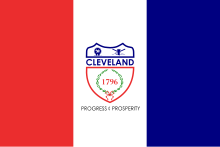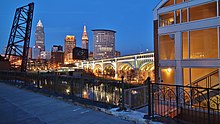Cleveland
Appearance



Cleveland is a major city in the U.S. state of Ohio, located along the southern shore of Lake Erie, across the U.S. maritime border with Canada. It was founded in 1796 near the mouth of the Cuyahoga River by General Moses Cleaveland, after whom the city was named. Its location on both the river and the lake shore allowed it to grow into a major commercial and industrial center, attracting large numbers of immigrants and migrants. A port city, Cleveland is connected to the Atlantic Ocean via the Saint Lawrence Seaway. The city's economy relies on diversified sectors such as manufacturing, financial services, healthcare, biomedicals, and higher education.
Quotes
[edit]- While I was in New Connecticut, I laid out a town, on the bank of Lake Erie, which was called by my name, and I believe the child is now born that may live to see that place as large as Old Windham.
- Gen. Moses Cleaveland, as quoted in A History of the City of Cleveland by James Harrison Kennedy (1896)
- With almost thirty thousand inhabitants [in 1855], Cleveland was a boomtown that would have thrilled any young man avid for business experience. It had drawn many transplants from New England who had brought along the Puritan mores and Yankee trading culture of their old hometowns. While the streets were largely unpaved and the town lacked a sewage system, Cleveland was expanding rapidly, with immigrants pouring in from Germany and England as well as the eastern seaboard.
- Ron Chernow, Titan: The Life of John D. Rockefeller, Sr. (1998), p. 45.
- Cleveland is a formidable city. It is a city with the biceps of industry and it has a rough-hewn manner that is indigenous to the Midwest of America. Cleveland also has some of the charm and grace of an old European city and, withal, it shows indisputable traces of its New England heritage as no other city west of the Alleghenies does.
- George E. Condon, Cleveland: The Best Kept Secret (1967), p. 4.
- I cannot forget the words of a New Yorker who ventured as far west as Cleveland a few years ago. He looked at the vast sweep of the forested city, the soft gray-blue lake lapping at the foot of the high bluffs, the ubiquitous placement of beautiful residential neighborhoods and parks, and he blinked. 'This Cleveland,' he said, pondering, 'has to be the best kept secret in the United States.' What he meant to say, of course, was that it was a secret to other Americans. Not the Russians. That is one thing you have to say about those Russians – they are quick to notice a good thing like Cleveland.
- George E. Condon, Cleveland: The Best Kept Secret (1967), p. 5.
- For all practical purposes, though – and hang the technicalities – everything east of the [Cuyahoga] river constitutes the East Side. Everything west of the river can be considered the West Side. That is the realistic view taken by Clevelanders. When two Clevelanders meet for the first time, they fence conversationally until the vital question of East or West is answered. Knowing which side of town a new acquaintance comes from makes a subtle difference.
- George E. Condon, Cleveland: The Best Kept Secret (1967), p. 9.
- It may be said that the people of Cleveland are opposites to the people of Texas; instead of boasting about the city's attributes, they dwell eloquently on its deficiencies to the extent, often, where outsiders feel compelled to take up the Cleveland cause in a curious reversal of normal American procedure.
- George E. Condon, Cleveland: The Best Kept Secret (1967), p. 320.
- The Cuyahoga's serpentine course and narrow physical limitations did not blind early observers to its special credentials and its great potential. Among the far-sighted ones were Benjamin Franklin, who in 1765 saw the military advantages in the establishment of an army post at the place where the Cuyahoga flows into Lake Erie, and George Washington, who recognized the practicability of a trade-and-travel connection of the Ohio River and the Great Lakes by way of the Cuyahoga and the Muskingum rivers and foresaw the day when a great city would rise on the site.
- George E. Condon, West of the Cuyahoga (2006), pp. xiii–xiv.
- When Donald Trump accepts the Republican nomination on Thursday in Cleveland, it will represent a stunning moment in American politics - The triumph of a raw populism, embodied by a shameless demagogue, over both the official establishment and the official ideology of a major political party.
- Ross Douthat, A Cure for Trumpism The New York Times (July 17, 2016)
- I always believed that I’d return to Cleveland and finish my career there. I just didn’t know when. After the season, free agency wasn’t even a thought. But I have two boys and my wife, Savannah, is pregnant with a girl. I started thinking about what it would be like to raise my family in my hometown. I looked at other teams, but I wasn’t going to leave Miami for anywhere except Cleveland. The more time passed, the more it felt right. This is what makes me happy.
- LeBron James, as quoted in LeBron: I'm coming back to Cleveland (July 2014), Sports Illustrated
- CLEVELAND! This is for you!
- NBA (December 24, 2016). "Final 3:39 of Game 7 of the 2016 NBA Finals". YouTube.
- LeBron James in his postgame interview with ABC's Doris Burke after the Cavaliers overcame a 3–1 deficit, dethroning the Golden State Warriors in the 2016 NBA Finals.
- I was super, super ecstatic to win one for Cleveland because of the 52-year drought. ... The first wave of emotion was when everyone saw me crying, like, that was all for 52 years of everything in sports that's gone on in Cleveland. And then after I stopped, I was like -- that one right there made you the greatest player of all time.
- LeBron James, interview (2018), ESPN
- I do not believe there is a city in the country where the electorate is so well informed upon local political questions, nor upon the rights of the people as opposed to the privileges of corporations, as it is in Cleveland.
- Tom L. Johnson, My Story (1911), p. 83.
- There were Hanna Democrats as well as Hanna Republicans – not that Hanna was the enthroned boss in the same sense that Cox is the boss of Cincinnati or Murphy of New York. Cleveland wasn't bossed by any one man. The city government belonged to the business interests generally.
- Tom L. Johnson, My Story (1911), p. 114.
- For a brief time in Cleveland, I was the man of power. I had what no black man in this country has had before: direct control of the government of a predominantly white population.
- Carl B. Stokes, Promises of Power (1973), p. 9.
- Cleveland has been a city in which "caretaker" mayors, men like Ralph S. Locher, Anthony J. Celebrezze and Frank J. Lausche, could respond mainly to public relations and ignore the gut issues.
- Carl B. Stokes, Promises of Power (1973), p. 93.
- Cleveland is a place where you actually can achieve something, where you can do something, where you can change something.
- Franz Welser-Möst, as quoted in "Franz Welser-Möst Extends Cleveland Orchestra Contract" (October 2, 2014), by Michael Cooper, The New York Times
- My heart is in Cleveland.
- Franz Welser-Möst, as quoted in "Cleveland and Other Cities: Up and Down" (August 2018), by Jay Nordlinger, National Review Online
External links
[edit] Encyclopedic article on Cleveland on Wikipedia
Encyclopedic article on Cleveland on Wikipedia
